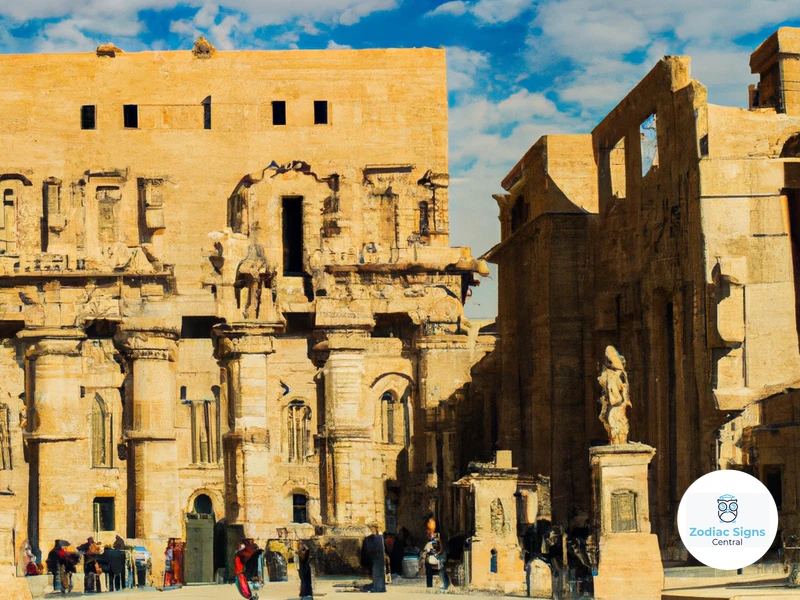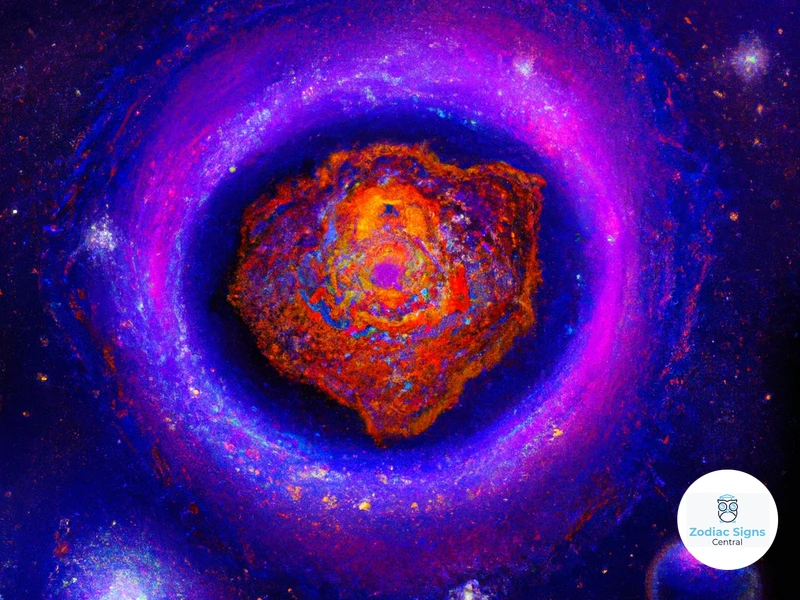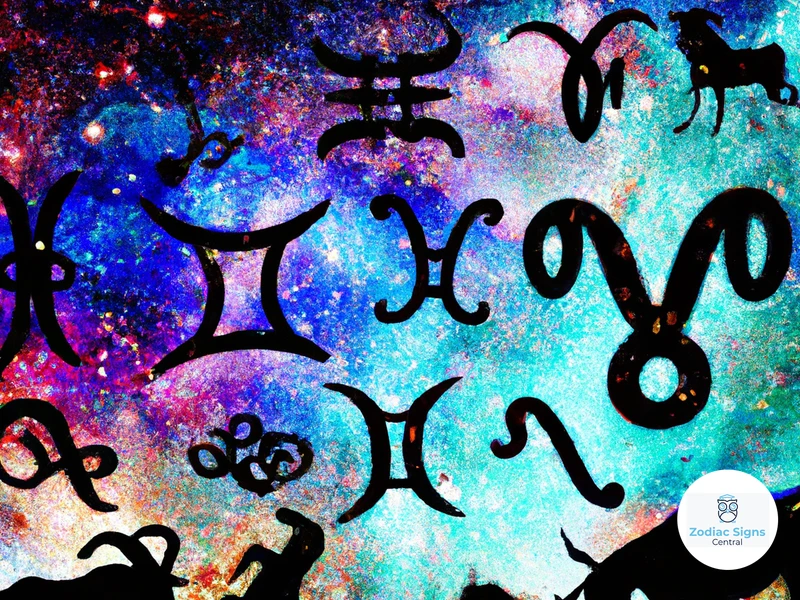Ancient Mesopotamia

Sumerian Astrology: The Sumerians, one of the earliest civilizations in Mesopotamia, had a profound interest in understanding celestial phenomena. They believed that the gods communicated their intentions through the movement of the stars. The Sumerians associated each zodiac sign with a particular god or goddess, such as Anu, the god of the sky, and Enlil, the god of wind and storms. These celestial deities were believed to influence the traits and destinies of individuals born under their respective signs.
Babylonian Astrology: Building upon the foundation laid by the Sumerians, the Babylonians further developed astrology and its connection to the zodiac signs. They divided the night sky into twelve equal parts and associated each section with a zodiac sign. The Babylonians were meticulous record-keepers, documenting astronomical observations and establishing the Babylonian zodiac, which still forms the basis of modern Western astrology. Over time, the Babylonians also started linking the movement of planets to various aspects of human life, such as relationships, health, and success.
The ancient Mesopotamians’ fascination with astrology and the zodiac signs left an indelible mark on future civilizations, as their practices and beliefs filtered through to other cultures. The knowledge and wisdom they gathered formed the foundation for the complex astrological systems we have today.
Ancient Egypt
The Influence of Egyptian Mythology: Egyptian mythology played a significant role in shaping the zodiac signs of ancient Egypt. The gods and goddesses represented different aspects of life, and each had a particular connection to certain zodiac signs. For example, Amon-Ra, the sun god, was associated with the zodiac sign Leo, symbolizing power and leadership. Isis, the goddess of fertility and motherhood, was linked to the zodiac sign Virgo, denoting nurturing and practicality.
The Egyptian Zodiac: The ancient Egyptians had two sets of zodiac signs – the more famous one based on the solar calendar and the lesser-known one based on the lunar calendar. The solar zodiac consisted of twelve signs, each correlated with a different month of the year. These signs were represented by various animals and deities, such as the lion, the ram, and the beetle. The lunar zodiac, on the other hand, consisted of thirty-six decans, which were smaller divisions of the sky that allocated ten days to each decan.
The ancient Egyptians used astrology for purposes like predicting auspicious times for various activities, understanding personal characteristics, and interpreting dreams. The zodiac signs in ancient Egypt were seen as a means of gaining insight into an individual’s personality, destiny, and even their afterlife. These mystical beliefs surrounding the zodiac signs continue to captivate people’s imaginations to this day.
Ancient Greece

Greek Mythology and the Gods: Greek mythology played a significant role in shaping the Greek zodiac. The twelve zodiac signs were associated with different gods and goddesses, each possessing unique characteristics and virtues. For example, Aries was linked to the god of war, Zeus, representing strength and bravery, while Taurus was associated with the goddess of love and beauty, Aphrodite, symbolizing sensuality and passion.
The Greek Zodiac: The Greek zodiac system consisted of twelve signs, each lasting for about a month. These signs were based on the astronomical divisions of the sky and were further influenced by the elements of earth, air, fire, and water. The Greeks believed that the elements played a significant role in shaping an individual’s personality. For instance, individuals born under the fire signs, such as Aries, Leo, and Sagittarius, were considered passionate and enthusiastic, while those born under the water signs, such as Cancer, Scorpio, and Pisces, were seen as emotional and intuitive.
Greek philosophers like Plato and Aristotle studied and discussed astrology, emphasizing the connection between the cosmos and human existence. Their teachings contributed to the popularization of astrology in ancient Greece and beyond.
The legacy of ancient Greece’s fascination with astrology and the zodiac signs continues to this day. We can still see the influence of Greek mythology and philosophy in our understanding of the zodiac and its impact on human lives.
Chinese Zodiac
Mythology and Symbolism: The Chinese zodiac has its roots in ancient Chinese mythology. According to legend, the Jade Emperor called for a great race to determine the order of the zodiac signs. The animals that finished first became the first signs of the zodiac, while those that arrived later occupied subsequent positions. Each animal symbolizes different characteristics and qualities. For example, the noble and authoritative Dragon represents power, while the diligent and practical Ox signifies hard work and determination.
The Chinese Zodiac Cycle: The twelve animal signs of the Chinese zodiac follow a specific order: Rat, Ox, Tiger, Rabbit, Dragon, Snake, Horse, Goat, Monkey, Rooster, Dog, and Pig. Each animal sign is also associated with one of the five elements: Wood, Fire, Earth, Metal, and Water. This creates a 60-year cycle, where each animal sign combines with an element, resulting in unique combinations.
The Chinese Zodiac is more than just a system for determining one’s animal sign; it has practical applications in various aspects of Chinese culture. People use it to select auspicious dates for events, determine compatibility in relationships, and even plan for future predictions. Understanding the Chinese Zodiac provides valuable insights into the rich tapestry of Chinese traditions and beliefs that have endured for centuries.
Indian Astrology

Vedic Astrology: Vedic astrology is based on the Vedas, the ancient sacred texts of India. It is a comprehensive system that takes into account not only the position of the planets but also the lunar nodes (Rahu and Ketu), which are believed to have a significant impact on one’s destiny. Vedic astrologers create detailed birth charts, known as “janam kundli,” that provide insights into an individual’s personality, relationships, career, and life events. These birth charts are created by calculating the positions of the planets at the time of birth, as well as the individual’s exact birth location.
The Indian Zodiac: In Indian astrology, the zodiac is divided into twelve equal parts, just like in Western astrology. However, the signs are aligned with the actual constellations in the sky. Each zodiac sign, or “rashi,” is associated with specific qualities, elements, ruled planets, and even body parts. For example, Aries, the first sign of the Indian zodiac, is associated with fire, aggression, and the head. The position of the moon at the time of birth is considered crucial in determining one’s lunar sign, or “rashi,” which plays a significant role in Indian astrology.
Indian astrology is deeply ingrained in Indian culture, and its predictions and remedies are sought after by millions of people. It offers valuable insights and guidance for individuals seeking to understand themselves better and navigate life’s challenges. Whether it’s understanding zodiac challenges, seeking astrological birth charts for healing, or exploring the work approach of specific zodiac signs like Virgos, Indian astrology provides a comprehensive and holistic system for self-reflection and personal growth.
Conclusion
Ancient Mesopotamia introduced the concept of associating zodiac signs with deities, with the Sumerians attributing divine traits and destinies to individuals born under specific signs. The Babylonians expanded upon this system and developed the zodiac as we know it today, dividing the night sky into twelve equal sections.
In Egypt, the rich tapestry of mythology influenced the creation of the Egyptian zodiac, with gods and goddesses playing a significant role in the symbolism associated with each sign. Greece, known for its captivating mythology, intertwined the stories of gods and heroes with the zodiac signs, creating a rich and intricate connection between astrology and its folklore.
The Chinese zodiac is heavily steeped in myth and symbolism, with each year represented by an animal that carries its own set of personality traits and characteristics. India, with its ancient Vedic astrology, offers a deep understanding of cosmic energies and their influence on human existence.
Throughout history, astrology has provided guidance and insight into various aspects of life, helping individuals navigate challenges and gain a deeper understanding of their own personalities and life paths. Whether it’s understanding zodiac challenges or harnessing the power of astrological birth charts for healing, zodiac signs continue to captivate our imagination and shape our understanding of ourselves and the world around us.
Internal Link: Virgos and Their Work Approach.
Frequently Asked Questions

1. What is the significance of zodiac signs in ancient Mesopotamia?
The people of ancient Mesopotamia believed that the celestial bodies held immense power and had a direct influence on human affairs. They developed complex systems of divination based on the movements of the stars and planets.
2. How did the Sumerians associate zodiac signs with gods and goddesses?
The Sumerians believed that each zodiac sign was associated with a specific god or goddess who had the power to influence the traits and destinies of individuals born under that sign. For example, Anu, the god of the sky, was associated with one of the zodiac signs.
3. What role did Babylonians play in the development of astrology?
The Babylonians further developed astrology by dividing the night sky into twelve equal parts and associating each section with a zodiac sign. They also started linking the movement of planets to various aspects of human life, such as relationships, health, and success.
4. Did the ancient Mesopotamians believe that zodiac signs could predict the future?
Yes, the ancient Mesopotamians believed that the position of the stars and planets at the time of a person’s birth could reveal insights about their future and personality traits. They used astrology as a tool for divination and decision-making.
5. How did the knowledge of ancient Mesopotamian astrology spread to other cultures?
As ancient Mesopotamia was a hub of trade and cultural exchange, the knowledge and practices of astrology and zodiac signs spread to other civilizations through interactions and influence. This dissemination of knowledge played a significant role in shaping astrological systems in other cultures.
6. Are the zodiac signs in ancient Mesopotamia the same as the modern Western zodiac signs?
While the concept of dividing the night sky into twelve equal parts and associating each section with a zodiac sign originated in ancient Mesopotamia, the specific constellation and names of the signs have evolved over time. However, the foundational system established by the Babylonians still forms the basis of modern Western astrology.
7. How did the Babylonians record astronomical observations for astrology?
The Babylonians were meticulous record-keepers and developed clay tablets with inscriptions documenting their astronomical observations. These records helped them establish patterns and correlations between celestial events and human experiences, contributing to the development of astrology.
8. Were zodiac signs and astrology limited to Mesopotamia in ancient times?
No, astrology and the study of zodiac signs had a widespread influence across ancient civilizations, extending beyond Mesopotamia. Egyptian, Greek, Chinese, and Indian cultures, among others, also developed their unique interpretations and practices related to zodiac signs.
9. Did the ancient Mesopotamians use zodiac signs for anything other than astrology?
Yes, besides astrology, the ancient Mesopotamians used zodiac signs for various purposes. They believed that the celestial bodies could serve as omens for events such as wars, natural disasters, and the rise and fall of kings. Astrology played a significant role in their religious and political decision-making.
10. How has the ancient Mesopotamian influence on zodiac signs shaped modern astrology?
The ancient Mesopotamian knowledge and practices laid the groundwork for the complex astrological systems we have today. The concepts they developed, such as dividing the night sky into twelve parts and associating zodiac signs with specific traits, symbolism, and predictions, continue to be foundational elements in modern astrology.
References
- What are zodiac signs? Their history and origin | Astrology
- The 4000 Year History of Horoscopes: How Astrology Has …
- Zodiac History and Signs Explained – Britannica
Frequently Asked Questions

1. How do ancient cultures influence the origins of Zodiac signs?
Ancient cultures played a significant role in shaping the origins of Zodiac signs. They developed unique astrological systems based on their mythology, beliefs, and observations of celestial bodies.
2. What is Sumerian astrology?
Sumerian astrology is one of the oldest known astrological systems, originating in ancient Mesopotamia. It is based on the belief that celestial events and the movements of celestial bodies have a profound impact on human life and the world.
3. How did Babylonian astrology contribute to the Zodiac signs?
Babylonian astrology further developed the astrological concepts introduced by the Sumerians. They assigned specific meanings and symbols to different constellations, paving the way for the creation of the Zodiac signs we know today.
4. How did Egyptian mythology influence the origins of Zodiac signs?
Egyptian mythology played a significant role in shaping the origins of Zodiac signs. The Egyptians associated various gods and goddesses with specific constellations and celestial events, attributing unique qualities and characteristics to each sign.
5. What is the Egyptian Zodiac?
The Egyptian Zodiac is a system of twelve signs connected to the twelve months of the year. Each sign is associated with a specific deity and reflects certain personality traits and characteristics.
6. What role did Greek mythology play in the development of Zodiac signs?
Greek mythology had a profound influence on the development of Zodiac signs. The Greeks associated different gods and goddesses with specific constellations, giving birth to the concept of the Greek Zodiac.
7. What is the Greek Zodiac?
The Greek Zodiac is a system of twelve signs, each associated with a specific constellation and mythological figure. It is believed to have originated from the observations and interpretations of celestial phenomena by ancient Greek astronomers and astrologers.
8. What is the Chinese Zodiac cycle?
The Chinese Zodiac cycle is a twelve-year cycle, with each year represented by a different animal sign. The cycle is based on a mythical race in Chinese folklore and is believed to influence a person’s personality traits and destiny.
9. What is Vedic Astrology?
Vedic Astrology, also known as Jyotish, is an ancient Indian system of astrology. It is based on the belief that celestial and cosmic energies influence human life and can be used to gain insights into various aspects of life, including personality traits, relationships, and events.
10. What is the Indian Zodiac?
The Indian Zodiac is divided into twelve signs, each associated with specific characteristics and ruled by a particular celestial body. It is an integral part of Vedic Astrology and is used to analyze and interpret various aspects of a person’s life and destiny.








